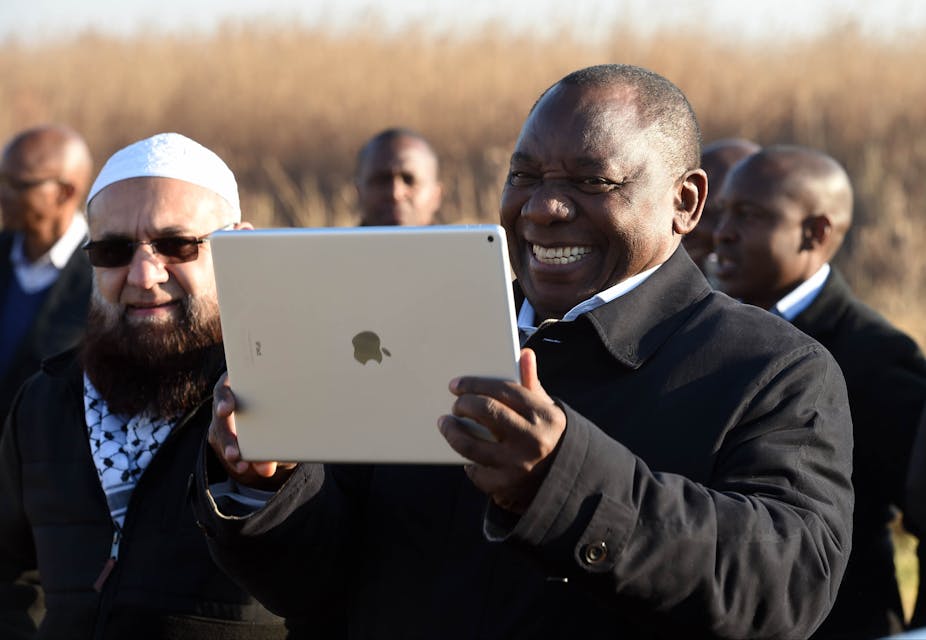The recent media “revelations” about South Africa’s Deputy President Cyril Ramaphosa’s several alleged extramarital affairs are the classic approach to creating doubt about a prominent person’s integrity.
They also call into question his claim to be a suitable moral or ethical alternative to President Jacob Zuma’s corrupt administration. The latest accusations are meant to attack the very foundation of his campaign to lead both the ANC and the country. Ramaphosa admitted to having had an affair a decade ago.
This is not the first time that prominent ANC personalities have been placed in a situation similar to Ramaphosa’s. In the past accusations were made against Kgalema Motlanthe, a former ANC secretary-general and deputy president, and against Blade Nzimande, general-secretary of the South African Communist Party (SACP) and Minister of Higher Education. The SACP is in a governing tri-partite alliance with the ANC and labour federation Cosatu.
More specific reports of alleged infidelity have appeared against Police Minister Fikile Mbalula and Jeff Radebe, minister in the Presidency. Marius Fransman, the ANC’s Western Cape leader, has been suspended for five years for sexual misconduct.
It would be inappropriate to generalise about all of them. And, with the available information, the Ramaphosa case appears to be an example of the tried-and-tested trick of spreading rumours about or exposing infidelity.
It is noteworthy that Ramaphosa’s defence mentions this directly, and that state institutions are being used (by the pro-Zuma group) to neutralise his election campaign:
It represents an escalation of a dirty war against those who are working to restore the values, principles and integrity of the African National Congress and society.
Ramaphosa is considered a frontrunner among the contenders to replace Zuma - ahead of the president’s preferred successor, Nkosazana Dlamini-Zuma.
Gunning for Ramaphosa
The campaign to discredit Ramaphosa has gone through several stages:
first, an attempt was made to compromise him by placing blame for the Marikana massacre on him.
Then he was discredited as a puppet of business who is being manipulated by “white monopoly capital”.
These were followed by the claim that he was being manipulated by a “white clique” that manage his election campaign and that he was, therefore, not genuinely “black”.
He was also accused of having beaten his ex-wife. But, she refuted the allegation.
The latest line of attack seeks to advance the view that his moral outrage against Zuma’s corruption and unethical leadership is compromised by his own immoral extramarital relations. Importantly, he admitted to having had an affair a decade ago.
But, the campaign to discredit Ramaphosa appears to not be getting the desired effect. The general sentiment among ANC spokespersons and those of Cosatu is one of dismay. Ramaphosa’s family and acquaintances have also dismissed the latest accusations against him.
The fact that some refers to events about eight years ago, and the fact that they openly challenge Ramaphosa’s character, point to possible ulterior motives.
Message to detractors
An important aspect of the current Ramaphosa case is that it is an indirect message to Zuma’s opponents. Zuma is making it clear that he still has sufficient access to intelligence agencies to expose the skeletons in their cupboards. It will likely dampen the emerging rebellion in the ANC. An example of such rebellion was seen during the recent motion of no confidence against him in Parliament. It saw 35 ANC MPs defy orders to toe the party line in the motion brought by the opposition.
If it’s seen in the same light as the Hawks’ investigations into former finance minister Trevor Manuel and his deputy Jabu Moleketi; and then former South African Revenue Service Commissioner Pravin Gordhan, about SARS intelligence and Treasury management; it sends a message to Ramaphosa supporters: to tread carefully in the future.
The fact that the ANC leadership nomination process has commenced, and that intense contestation can be expected ahead of the party’s national elective conference in December, the possibility of serious incidents shouldn’t be excluded.
Political assassinations already underway in KwaZulu-Natal might increase.
Serious setbacks
Another important symptom of the motive behind the Ramaphosa case is the fact that Zuma has experienced a set of serious setbacks lately. These include that:
the Guptas, the business family and his friends at the centre of state capture, are suffering a meltdown;
there are new parliamentary investigations into state capture;
the demise of his key supporters in government agencies (like Brian Molefe, Ben Ngubane, Hlaudi Motsoeneng, Berning Ntlemeza);
the South African Broadcasting Corporation is increasingly exhibiting independence;
the ANC’s parliamentary caucus is rebelling against him;
he has suffered several negative court judgments; and
the UK public relations company Bell Pottinger’s woes have also discredited Zuma’s mantra of “white monopoly capital”. The British public relations company employed by the Gupta business empire got embroiled in ANC internal politics. It has since been sanctioned for its role in promoting the racially divisive “white monopoly capital” narrative sponsored by the Guptas, Zuma’s friends at the core of state capture allegations.
Warning to the media
The months leading towards the ANC’s December conference will be a trying period for the South African mainstream media. They are a lucrative target for abuse by the two main ANC election campaigns.
Leaks, planted information, fake news and attempts to lure journalists to support either faction are all very likely possibilities. The Ramaphosa case has been the first major test for the media. Clear editorial policies, uncompromised ethical practices and exceptional professionalism are what will see the media through. It cannot afford mistakes or miscalculations in the next four months.

